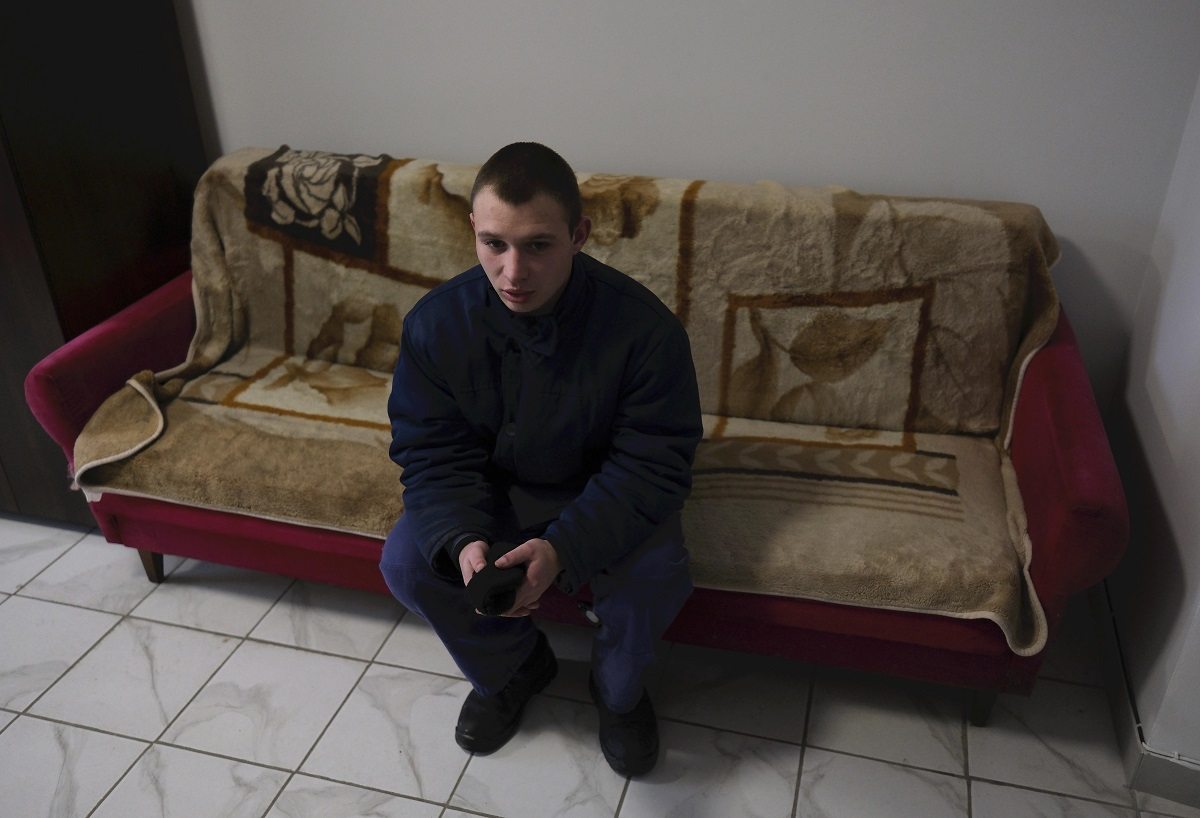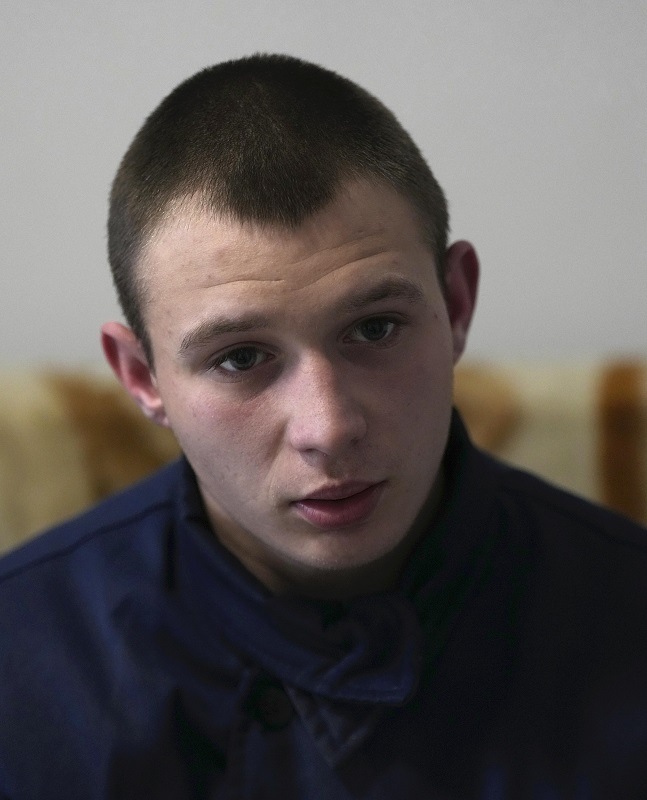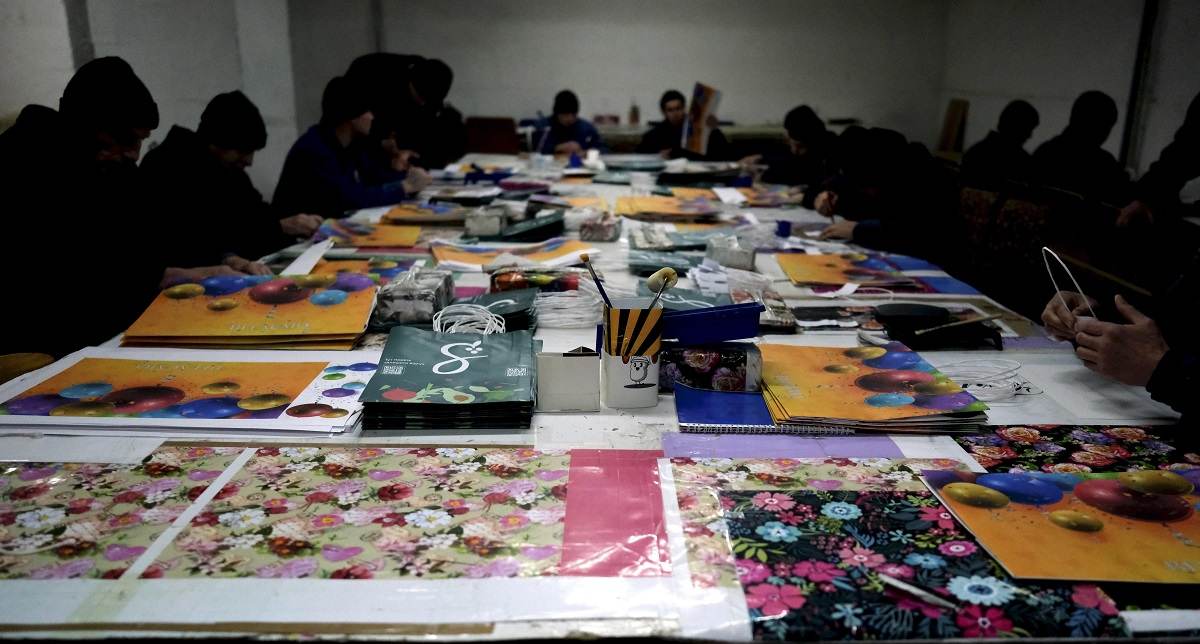Russian Soldier: We Were Sent to Hell and Treated Like Dogs; POW Relates Horrific Conditions on Frontline of Ukraine War

Kiril Pess speaks in an interview.
17:14 JST, February 19, 2024
LVIV, Ukraine — A 20-year-old Russian soldier described the horrific conditions on the frontlines of the war with Ukraine, telling The Yomiuri Shimbun during a recent interview that he and his comrades were sent to hell and treated like dogs.
Interviewed at a prisoner of war facility on the outskirts of Lviv, Ukraine, in late January, Kiril Pess spoke matter-of-factly about the front lines of the war. Russian soldiers were ordered to advance toward the enemy across a field with no cover, he said, walking amid the dead bodies of other russians and shooting with Kalashnikov rifles.

Kiril Pess
“The places we were sent to were sheer hell,” Pess said.
With a shaved head and blue eyes, Pess has a slight build and an air of youthful innocence. He was a member of the “Storm Z” assault unit that convicts and soldiers who had violated military discipline were assigned to as punishment.
Pess was sentenced to seven years in prison for the murder of two people when he was 17. He said he got into a fight with two men on his way home from a nightclub with a friend, and stabbed them with a knife he was carrying.
In February 2022, about six months after he was imprisoned, Russia launched its war against Ukraine.
A few months later, the founder of the Wagner private military, Yevgeny Prigozhin, visited Pess and others at the prison to recruit them. Pess did not sign up because he “did not want to die,” he said.
Last May, the Russian Defense Ministry began recruiting soldiers, saying they would be exempted from imprisonment and their criminal records expunged after six months of service. They would also be paid.
Pess had no intention of joining but said that prison officials strongly pressured him to do so, warning that they could add seven or 15 years to his sentence for allegedly violating prison discipline.
“I had no choice but to become a soldier,” Pess said.
After a month of training, he was sent to the area around Bilohorivka in eastern Luhansk Province, where Ukraine was on the offensive. Pess said that as soon as he arrived, he thought he would not return home alive.
He was given a bulletproof vest and helmet that had been removed from a dead soldier. The Kalashnikov rifle he received was old-fashioned, and he was also given a hand grenade with his name on it to use as a suicide bomb if he was captured by Ukrainian soldiers.
Pess was moved from site to site of furious battles. His troop suffered its greatest losses in Urozhaine, a southwestern region of Donetsk Province.
“There were 30 of us in the unit, and everyone died except me,” he said.
Treated like dogs

Russian soldiers make paper bags at a prisoner-of-war camp in a suburb of Lviv, western Ukraine, on Jan. 25.
Pess’s voice was calm throughout the interview, but he became teary-eyed from time to time.
“We were called dogs and treated badly. My elder brother was killed by his commanding officer,” he said.
We visited the camp on the outskirts of Lviv with several Ukrainian and Polish media companies and spent a total of five hours interviewing prisoners.
We were allowed to speak to the prisoners freely, and talked to people who were recuperating in the infirmary, serving food at a canteen or doing some work. We asked them for interviews at random, but only about 10 agreed to speak.
Many shook their heads and said they didn’t want to talk.
Pess raised his hand when a camp official asked prisoners in line in the hallway if any of them were from Storm Z.
He said Storm Z members were not allowed to take Ukrainian soldiers captive. Pess’ superior reportedly told them that the job of the criminals was to kill the enemy.
His brother, who was one year older than Pess, was also sent as a Storm Z soldier to Bakhmut, a strategic point in the eastern Donetsk. After taking a Ukrainian back as a prisoner of war, his brother was shot in the head by a commanding officer, Pess said.
His family was told that he died on a special mission, but a member of the same unit told them the truth.
Pess’ distrust of the Russian military further intensified. He was supposed to be in the unit for six months, but this was “extended by one year.” His monthly salary, 200,000 rubles (¥330,000), was only partially paid.
Some soldiers became dependent on alcohol or drugs as they were mentally exhausted. There also were commanders who forced their men’s faces into puddles and stomped on them, Pess said.
Contrary to such commanders, Prigozhin was regarded a hero by the soldiers. A rumor circulated on the frontline that, although the ministry deceives soldiers, Wagner takes care of them and Prigozhin always tells them the truth.
Pess said nobody believed the reports that Prigozhin died in a plane crash in August last year. Pess himself still believes it is “fake news.”
In late August last year, Pess was surrounded by Ukrainian forces and taken prisoner. He said he thought, “It’s over,” since he had been told that his genitals, hands and feet would be amputated if he became a POW.
But he could not pull the pin of the grenade. “I thought: ‘I’m still young. I might have a chance to start over,’” he said.
Contrary to his expectations, he was not tortured or humiliated in Ukraine.
“I had been convinced that Ukrainians were Nazis or monsters. What was broadcast on Russian television was a lie,” Pess said.
Top Articles in World
-

Israeli Ambassador to Japan Speaks about Japan’s Role in the Reconstruction of Gaza
-

Videos Plagiarized, Reposted with False Subtitles Claiming ‘Ryukyu Belongs to China’; Anti-China False Information Also Posted in Japan
-

Chinese Embassy in Japan Reiterates Call for Chinese People to Refrain from Traveling to Japan; Call Comes in Wake of ¥400 Mil. Robbery
-

Nepal Bus Crash Kills 19 People, Injures 25 Including One Japanese National
-

Russia: Visa Required for Visiting Graves in Northern Territories, Lifting of Sanctions Also Necessary
JN ACCESS RANKING
-

Producer Behind Pop Group XG Arrested for Cocaine Possession
-

Japan PM Takaichi’s Cabinet Resigns en Masse
-

Man Infected with Measles Reportedly Dined at Restaurant in Tokyo Station
-

Israeli Ambassador to Japan Speaks about Japan’s Role in the Reconstruction of Gaza
-

Videos Plagiarized, Reposted with False Subtitles Claiming ‘Ryukyu Belongs to China’; Anti-China False Information Also Posted in Japan

























